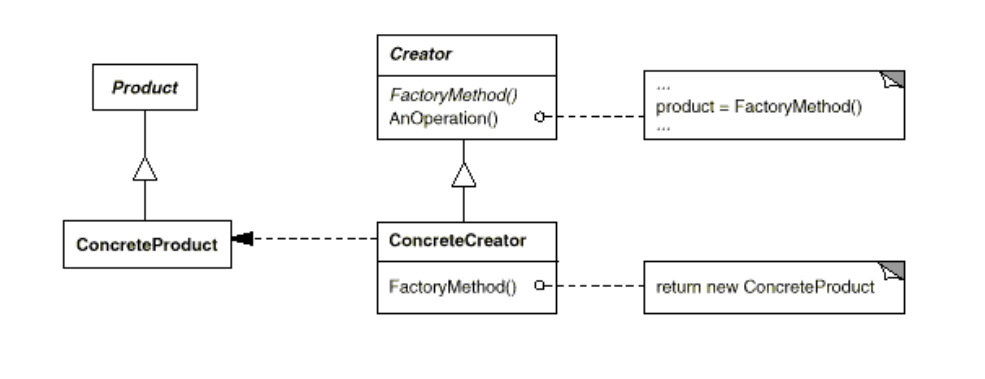3. Factory Method
- Intent:
- Define an interface for creating an object, but let subclasses decide which class to instantiate. Factory Method lets a class defer instantiation to subclasses.
- Also Known As:
- Virtual Constructor
- Applicability:
- a class can’t anticipate the class of objects it must create.
- a class wants its subclasses to specify the objects it creates.
- classes delegate responsibility to one of several helper subclasses, and you want to localize the knowledge of which helper subclass is the delegate.
- Motivation:
- Frameworks use abstract classes to define and maintain relationships between objects. A framework is often responsible for creating these objects as well.
- Structure:

- Participants:
- Product (Document)
- defines the interface of objects the factory method creates.
- ConcreteProduct (MyDocument)
- implements the Product interface.
- Creator (Application)
- declares the factory method, which returns an object of type Product. Creator may also define a default implementation of the factory method that returns a default ConcreteProduct object.
- may call the factory method to create a Product object.
- ConcreteCreator (MyApplication)
- overrides the factory method to return an instance of a ConcreteProduct.
- Product (Document)
- Collaborations
- ConcreteCreator to define the factory method(Creator declares) so that it returns an instance of the appropriate ConcreteProduct.
- Consequences:
- 1.Provides hooks for subclasses.
- 2.Connects parallel class hierarchies.
- Related Patterns:
- Abstract Factory is often implemented with factory methods.
- Factory methods are usually called within Template Methods.
- Prototypes don’t require subclassing Creator.However, they often require an Initialize operation on the Product class. Creator uses Initialize to initializethe object. Factory Method doesn’t require such an operation.
Interaction diagram

-
Code Sample
//product interface public interface Sender { public void Send(); } //two concrete product classes public class MailSender implements Sender { @Override public void Send() { System.out.println("this is mailsender!"); } } public class SmsSender implements Sender { @Override public void Send() { System.out.println("this is sms sender!"); } } //provider interface public interface Provider { public Sender produce(); } //two factory concrete class public class SendMailFactory implements Provider { @Override public Sender produce(){ return new MailSender(); } } public class SendSmsFactory implements Provider{ @Override public Sender produce() { return new SmsSender(); } } //test public class Test { public static void main(String[] args) { Provider provider = new SendMailFactory(); Sender sender = provider.produce(); sender.Send(); } }
